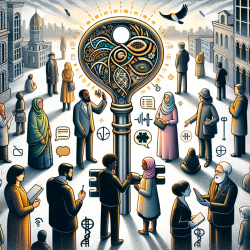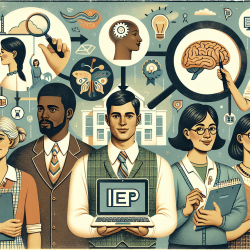Enhancing Communication Skills: A Data-Driven Approach
Effective communication is a cornerstone of successful interactions, especially in the realm of healthcare and education. The Development of a Brazilian Portuguese adapted version of the Gap-Kalamazoo communication skills assessment form offers a compelling insight into enhancing communication skills through a validated assessment tool. This blog will explore how practitioners can leverage this tool to improve their communication competencies and encourage further research in this critical area.
The Gap-Kalamazoo Communication Skills Assessment Form
The Gap-Kalamazoo Communication Skills Assessment Form (GKCSAF) is a robust tool originally designed to evaluate communication skills within medical settings. It has been extensively piloted at institutions like Harvard Medical School and the University of Louisville, focusing on the gaps between self-assessment, peer evaluation, and patient feedback during simulated encounters. The GKCSAF includes essential elements such as building relationships, gathering information, and demonstrating empathy, crucial for effective communication.
Adapting the Tool for Brazilian Context
The recent study aimed to translate and validate the GKCSAF for the Brazilian cultural setting. The translation process involved bilingual professionals and a rigorous Delphi technique to ensure semantic and conceptual equivalence. The final tool was tested through videotaped simulations, demonstrating high internal consistency (Cronbach’s alpha = 0.818) and test-retest reliability (intra-class correlation coefficient = 0.942).
Why This Matters for Practitioners
For practitioners, particularly those in speech-language pathology and education, the GKCSAF offers a structured method to assess and improve communication skills. By using this tool, practitioners can:
- Identify strengths and areas for improvement in communication.
- Receive quantitative feedback that informs professional development.
- Engage in self-reflection and peer discussions to enhance learning.
The validated Brazilian version of the GKCSAF ensures that these benefits are accessible to Portuguese-speaking practitioners, promoting a more inclusive approach to communication skill development.
Encouraging Further Research
The adaptation of the GKCSAF highlights the importance of culturally relevant tools in education and healthcare. Practitioners are encouraged to participate in further research to explore the tool's application across different settings and populations. Such research can contribute to a deeper understanding of communication dynamics and lead to improved educational outcomes.
Conclusion
By integrating the GKCSAF into practice, practitioners can make data-driven decisions to enhance communication skills, ultimately leading to better outcomes for children and patients. The tool's adaptability and reliability make it a valuable resource for ongoing professional development.
To read the original research paper, please follow this link: Development of a Brazilian Portuguese adapted version of the Gap-Kalamazoo communication skills assessment form.










